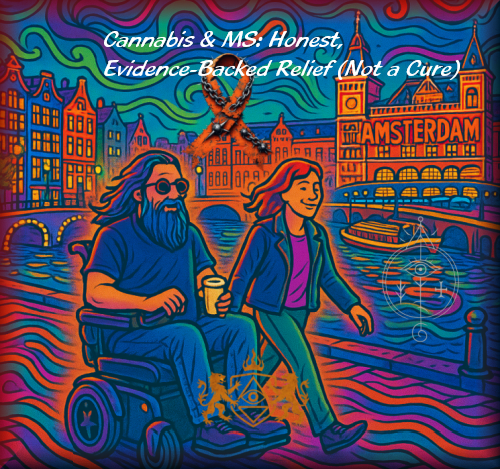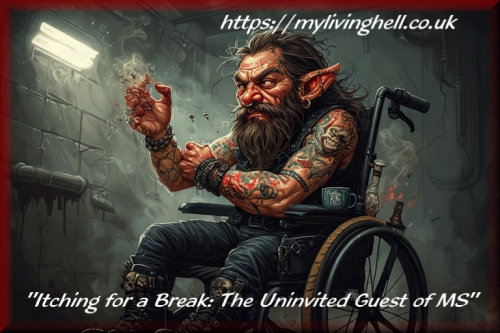- Posted on
⚠️ Please read with care: This blog shares personal, sometimes painful experiences. My intention is to support and speak honestly not to harm. I’m not a professional, just someone who understands how hard it can get. If you're struggling, you're not alone please reach out for professional help.
“Cannabis isn’t a cure. But for me (and many others) it sometimes feels like lowering the waterline so I’m not constantly drowning.”
Living with multiple sclerosis is like being handed a body that’s half-conspirator, half-prison guard. One day it lets you move, the next it locks you in with pain, spasms, and exhaustion. People who don’t live it often don’t get it. That ignorance can make conversations about treatments uncomfortable—especially when cannabis comes up.
Cannabis still carries heavy stigma. For decades it’s been painted as the drug of lazy teenagers, a dangerous gateway, or a “last resort.” But the reality is more complicated. For many with MS, cannabis isn’t about chasing a high it’s about clawing back a bit of life. It’s not a cure, and it never will be. What it can do, in the right form, for the right person, is bring relief. Sometimes small, sometimes significant, always worth noticing.
What the evidence actually says
Science is messy, but let’s strip it down to what we know. Cannabis is a plant, yes, but the two compounds that matter most in MS treatment are:
THC (tetrahydrocannabinol): The part that makes people high. Psychoactive, strong, and for some people, too much.
CBD (cannabidiol): Doesn’t produce a high. Interacts differently in the body, often described as the calming counterpart to THC.
Together, in carefully balanced medical products, they can target symptoms that MS brings to the table.
Spasticity: where cannabis shines
This is the symptom where cannabis shows the clearest benefit. Studies and lived experience show that THC+CBD sprays such as Sativex (available in the UK under specialist prescription) can reduce muscle stiffness and spasms. People report less pain, easier sleep, and more control. Clinical tools that doctors use don’t always capture the full effect, but patients’ own reports matter. Relief you can feel is relief that counts.
Neuropathic pain: promising, but mixed
Neuropathic pain is one of the cruellest symptoms of MS burning, stabbing, electric shocks that don’t stop. Some trials show cannabis extracts help reduce this pain, particularly when other drugs fail. Others find only modest benefits. What’s clear is that many patients experience genuine improvement, even if not every study proves it on paper.
Sleep and quality of life: secondary gains
When stiffness and pain ease, sleep improves. Better sleep ripples out into mood, energy, and daily functioning. These knock-on benefits often don’t make it into study data, but they matter enormously in real life.
Why the stigma lingers
Say “cannabis” and too many people still picture a stoner on a sofa surrounded by crisp packets. For someone with MS, that stereotype is a slap in the face. You’re not looking to escape you’re trying to ease spasticity enough to get through the night without screaming into your pillow.
The stigma is political and cultural, not medical. Cannabis was demonised for decades, and even though attitudes are shifting, the old narratives cling on. In the UK, cannabis-based medicines are legal—but only under strict circumstances, and only through specialist doctors. Most GPs can’t or won’t prescribe. That leaves many people sourcing CBD oils or black-market products, where quality is questionable and legality is a grey cloud hanging overhead.
Risks and realities
Let’s not polish this into a miracle. Cannabis has risks. Honesty is what dismantles stigma, not over-promising.
Cognitive fog: MS already messes with memory and focus. THC can worsen that for some.
Mental health risks: High-THC strains can trigger anxiety or paranoia, especially in people already vulnerable.
Physical side effects: Dizziness, fatigue, nausea, and changes in heart rate or blood pressure.
Dependence: Rare with medical, controlled use, but not impossible.
These don’t mean cannabis is “bad.” They mean it’s a tool, and tools need skill to use safely. The difference between relief and trouble often comes down to dose, formulation, and medical oversight.
Why it matters anyway
Here’s the thing: when you live with MS, symptom relief is gold dust.
Even a 20% drop in pain, even one less night of spasms, even an extra hour of sleep it all adds up. That can mean the difference between being stuck in bed all day or having enough energy to make breakfast. Between drowning in pain and keeping your head above water.
Cannabis offers that to some. Not all, not always, but enough that it deserves respect and consideration rather than judgement and whispers.
What needs to change
Research is still catching up. Decades of stigma slowed everything down. What we need now are:
More trials: Larger, longer, better-designed studies.
Clearer guidance: What dose works? Which formulation spray, oil, vapor, capsule?
Doctor training: So patients aren’t left educating their own clinicians.
Legal access: Safe, regulated supply that doesn’t force people into the shadows.
Until then, people with MS continue to experiment quietly, often without the support they deserve.
The bottom line
Cannabis won’t cure MS. It won’t rewind the clock, repair nerves, or erase uncertainty. But it can lower the waterline. It can turn nights of relentless spasms into nights of sleep. It can dull the sharp edge of pain. It can hand back small fragments of control, and in a life where MS takes so much, those fragments matter.
So let’s talk about cannabis without shame, without stigma, and without fantasy. Let’s call it what it is: a tool. Not a miracle, not a menace, but something that, for many, makes life with MS just a little more bearable.
Quick facts: Cannabis & MS
Not a cure. Cannabis doesn’t reverse MS; it’s used for symptom relief.
Most evidence = spasticity. THC+CBD sprays (e.g., nabiximols/Sativex) show the clearest benefit for muscle stiffness and spasms.
Pain help is promising. Many people report reduced neuropathic pain; trials are mixed but patient reports matter.
Sleep & quality of life: Indirect benefits (better sleep, less waking from spasms) often improve day-to-day functioning.
Risks exist: possible cognitive slowing, anxiety/paranoia with high-THC, dizziness, cardiovascular effects, and dependence risk.
Formulation matters: spray, oil, vaping, or edibles deliver different effects — dose and ratio (THC:CBD) are key.
Legal note (UK): Medicinal cannabis is prescribable but tightly regulated; specialist prescription is usually required.
Practical tip: Start low, go slow. Use reliable sources and consult a clinician familiar with MS and cannabis.
I write in ink and fury, in breath and broken bone.
Through storm and silence, I survive. That is the crime and the miracle.

